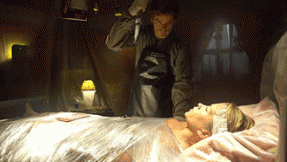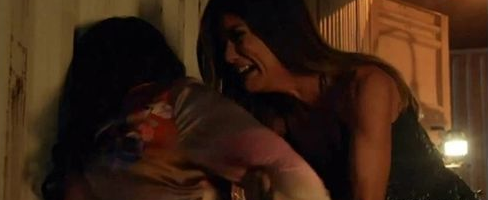Dexter: The Tragic Hero?
WARNING: Spoilers for all previous seasons of Dexter ahead!
Aristotle defined a tragic hero as one that evokes a sense of pity or fear, stemming from a person experiencing disproportionate misfortune, and that we may recognise ourselves in that person, identifying that this misfortune could befall us. Shakespeare’s tragic heroes are generally good people of high position whose actions, because of their position, have far-reaching effects. They usually possess a character quality which then becomes their fatal flaw and so makes further errors in judgement and becomes blind to reality.

Dexter Morgan’s status as a blood-spatter analyst in the Miami Metro may not make him noble in the Shakespearean sense, but his position means that his actions, and use of police resources, have severe consequences in terms of criminal justice. Dexter’s quality is his intense sense of justice which becomes a fatal flaw because his methods and execution (literally) are outside of the law. This fatal flaw is the direct result of Harry’s teachings, and perhaps it was Harry’s fatal flaw that made him protect Dexter from the mental health and criminal justice system. Harry’s supposed knowledge that nothing would ever be able to prevent Dexter from his urges is the seed that bore a flaw of Dexter’s own. Whilst there is no way to know whether Dexter could be saved from his Dark Passenger (as he refers to it) there is no question that Harry’s teachings made him the unconventional hero that he is. Yet as with all tragic heroes, Dexter has put himself onto a slippery moral slope. Within the show’s suspended reality he is a moral paragon, but the mistakes he has made during the past few seasons have set him up for a great fall. Despite these mistakes, and Deb’s frequent warnings, Dexter has stopped being able to see the danger he has started to bring upon himself and those he loves. As he loses this sight he also loses control of the secret life and facade that have always at best been precarious.
 The way that Dexter, and his portrayal by Michael C. Hall, have been received by general audiences is unique in the sense that we are rooting for a serial killer as the hero. Was there ever to be a serial killer who only killed killers (until last season) exposed in the public eye, outside of the suspended belief perpetuated by the show? It is certain that the mainstream reaction would be fear and horror, with only a slight inkling of approval for the justice served. Yet the concentration of these feelings seems to be reversed for the show’s audience. We are conditioned by Dexter’s gentle and genial demeanour, as are those around him, and so forgive his gruesome actions because he convinces us that they are just. In a classic tragedy his sense of virtue would render him a hero, and we accept him as such. Perhaps it is a discontent with the real-life police force that allows an audience to see Dexter as having the power of the department behind him without having to waste time with the paperwork or criminals escaping through loopholes. Dexter shows us this repeatedly. In “The Dark… Whatever” it’s mentioned that if they could just access the juvenile detention records they would be able to track down who the arsonist is. Dexter does just this, breaking several laws in the process, and finds him immediately. Dexter’s methods get results that prevent further death, so an audience will accept them as permissible for the greater good. In both the UK and the US there have been repeated exposés of police corruption, and it is well known that often criminals are not prosecuted due to complicated clauses or even that the cost of the trial would not be worth punishing the crime.
The way that Dexter, and his portrayal by Michael C. Hall, have been received by general audiences is unique in the sense that we are rooting for a serial killer as the hero. Was there ever to be a serial killer who only killed killers (until last season) exposed in the public eye, outside of the suspended belief perpetuated by the show? It is certain that the mainstream reaction would be fear and horror, with only a slight inkling of approval for the justice served. Yet the concentration of these feelings seems to be reversed for the show’s audience. We are conditioned by Dexter’s gentle and genial demeanour, as are those around him, and so forgive his gruesome actions because he convinces us that they are just. In a classic tragedy his sense of virtue would render him a hero, and we accept him as such. Perhaps it is a discontent with the real-life police force that allows an audience to see Dexter as having the power of the department behind him without having to waste time with the paperwork or criminals escaping through loopholes. Dexter shows us this repeatedly. In “The Dark… Whatever” it’s mentioned that if they could just access the juvenile detention records they would be able to track down who the arsonist is. Dexter does just this, breaking several laws in the process, and finds him immediately. Dexter’s methods get results that prevent further death, so an audience will accept them as permissible for the greater good. In both the UK and the US there have been repeated exposés of police corruption, and it is well known that often criminals are not prosecuted due to complicated clauses or even that the cost of the trial would not be worth punishing the crime.
So if these small ignorances in administrative law are not perceived as errors of judgement, the errors that Dexter do make must be more exaggerated. In the last season we saw this more than ever. Whilst Dexter’s fatal flaw/Dark Passenger has been present throughout the series, his misfortunes have never been so self-inflicted and extensive as this season. Rita’s murder in Season 4 signified the most prominent moment where Dexter’s crimes started affecting not just his life, but the lives of those he loves. Here Dexter first realised how his dangerous pastime could affect those around him, and how his stubbornness can backfire. It was his insistence to take down Trinity in his own petulant way, despite knowing that he was carrying on killing for some time, that led to Rita’s death. His indifference to Rita in Season 1 had changed dramatically by this point, and his devastation upon finding her body amplified this growth in his emotional capacity. In the opening to Season 5 he says, “She had a big heart, big enough for the both of us, had to be, I wasn’t even human when we first met… She died a brutal death, and I can’t fix it. But I know I have to try”. This also demonstrated how Dexter is not infallible. Previously he had always found a way to fix his mistakes because before he was the only one at risk, but here was unable to protect those closest to him.

His subsequent romance with (adoption of?) Lumen took this further and was riddled with errors of judgement. This was the first time that Dexter felt a connection with a partner who knew about his Dark Passenger, and this feeling of openness with her clouded his usual reasoning. Deb frequently questioned his relationship with Lumen as he set her up to live in the house he shared with Rita. Even though Lumen was aware of Dexter’s crimes he still insisted on keeping her separate from that part of his life. Whilst he was hunting down her abusers he denied her pleas to give out this justice with him. Dexter knew that once she killed someone she would no longer be the innocent that he desired. Dexter needed Lumen to feel he was saving her to make up for being at fault for Rita’s death, and hoped that he would find absolution in this balance. Once she did kill, she no longer needed saving and no longer needed Dexter’s protection, which led to the natural end of this mutually beneficial relationship.

As Dexter recovered from Rita’s death he did not return to his own detached emotional status quo that he seemed to be hoping for. He had combined his personal life and secret life for the first time, and had found solace in it. This put him on a slippery slope allowing him to get to a point where he falls in love with Hannah. As she knew his crimes, and was not an innocent like Lumen, he was able to fully share with her without fear as she was already the same as him. Unfortunately Dexter did not realise how he was unique as a moral serial killer, and so did not realise the danger he was putting Deb in until it was too late.
Season 7 has seen Dexter take some almost alien turns of character as, like the greatest of tragic heroes, he starts to lose grip with the artifice he presents to other people, and to himself. In the pilot episode he tells us, “I don’t understand sex…when it comes to the actual act of sex, it’s always just seemed so undignified”. Yet it is lust that clouds his judgement with Hannah on the kill table and for the first time he chooses the desire for sex over his desire to kill. From hereon Dexter’s code gets muddier and muddier. He kills Hannah’s father even though he doesn’t fit the code, and admits that his “Dark Passenger” is the equivalent to a naughty imaginary friend so that he can abstain from the responsibilities of his actions. He says, “The Dark Passenger has been with me ever since I can remember, pulling the strings, running the show. But, has it turns out, I’m not the puppet.” This admission that he is not the puppet suggests an admission of his own chosen immorality. The murder of Hannah’s father, and his plan for LaGuerta in the final episode of Season 7 signifies this erosion in his values and this rapid degradation of Dexter’s morals is reminiscent of Macbeth. Whilst Macbeth is initially pushed into indulging his fatal flaw, the mistakes he makes as a result reflect the downward spiral in his clarity and his values. The Dark Passenger acts as a Lady Macbeth figure, giving Dexter the excuse to push himself into darker realms that his moral persona would never dream of. Like Macbeth, every move he makes is against his previous honour and gives the Dark Passenger more freedom from his humanity than ever before.
Dexter’s realisation that he is his own Dark Passenger is a pinnacle moment in what will most likely become his downfall. The full acceptance of this can only lead to two opposing outcomes: Dexter embraces and consumes his Dark Passenger into himself and no longer heeds or needs Harry’s code to absolve himself from his actions, or the guilt brings about his intentional self-destruction. It’s likely that Deb will be the key to tip this balance either way. She and Dexter are now too intertwined for her to escape without consequence. Her knowledge of Dexter’s Dark Passenger may have made her a witness which was dangerous enough, as confirmed by Hannah’s keen assessment of Deb’s situation. Worse than this, the murder of LaGuerta has now made her a willing participant not only implicated by Dexter’s crimes, but with one far more serious of her own: killing the Captain of the Miami Metro.

Dexter’s status as the hero in this tragedy does leave him at a disadvantage for the show’s close. The main rule of tragic heroes, particularly Shakespearean tragic heroes, is that they must die. Their fatal flaw destines them for an ending rife with bloodshed. Whether this will be the case for Dexter is questionable. When he turns Hannah in for the murder of Sal Price she says to him, “You should have killed me” insinuating that a life in prison is a fate worse than death. Like Oedipus he would then be forced to live with his flaw, facing his crimes and the devastation his exposure would have on those he cares for. Dexter does seem like it will end with the demise of its eponymous character as, whilst we as the audience may root for him to escape this justice, this end would be ultimately dissatisfying to a viewer. Dexter is a show about justice, and it would be fitting for him to face his own retribution in its final hours. Within the show he has admitted to himself and to Harry that the life he created as a cover, and those around him that he previously used to those ends, have become parts of him that he now does not want to leave. Due to this a final escape is not one that will be the best course of action. For Dexter to truly fulfill his hero status, to conclude this tragic narrative a tragic end must befall him.
What do you think? Leave a comment.











Very intriguing essay. I consider Dexter not a vigilante like Batman, he’s a psycho serial killer.
He has every trace of that condition.
– Suffered from a childhood trauma that defined him, just as it did with his brother.
– Killed animals when he was a child.
– Has no self-control and goes to extreme lengths to kill because he needs to, not because he’s some sort of vigilante hero, but because he has the psychological and probably even physical need to KILL. He’s just like an addict.
– Has had monologues and dialogues about needing the control he feels when killing. Watch his speech in that room with Lila. Pay attention to what he says when he explains to Miguel why he enjoys killing people. This is a psychological trace of many, if not every, serial killer we know.
– If what he wants is justice, why would he damage investigations that would lead to certain life in prison or even death penalty? Again, an addict. A vigilante doesn’t ruin investigations to take the guilty ones out himself, he does it to the ones that escaped, a.k.a “justice”.
He had a figure of authority playing the role of his conscience even when he was alive. Lack of empathy doesn’t make you unable to tell right from wrong. Which Dexter does. He hasn’t shown any remorse about killing innocents, besides freaking out because he hasn’t followed the code the figure of authority in his life taught him. Just compare him to Deb when she causes the death of a person and thinks it’s her fault. Dexter doesn’t care about the victim, he cares about the code.
I do agree with you, that Dexter is without a doubt just a psycho killer on a base level, but I don’t think that means he has no moral tendencies despite rarely showing remorse. When Hannah made him realise the Dark Passenger was his own construct he definitely freaked out about being responsible for death, if just for a few minutes. Dexter does kill as a result of an addiction, as you say, but the code helps him (and the audience) to overlook this and excuse him as a vigilante hero. You are right though that this, in the beginning at least, was just a cover for him to fulfill his base urge to kill.
He definitely has a bloodlust about him.
Magnificent and really in-depth article. I loved that you mentioned Lumen and her impact on Dexter, which I think most people neglect. I am interested in your concept of self-destruction, as I had never considered such an ending. How would it come to that? Would it be that it is either kill himself (or be killed) or be incarcerated? I definitely think that, in order to satisfy the audience fully, Dexter does need to die. Anyway, I think that the action will probably lead to such a conclusion, while I do not want to speculate how. In addition, I know this is a nit-pick, but when you say the “LAPD”, I suppose you mean the Los Angeles Police Department, whereas LaGuerta was the captain of the Miami Metro Police Department. Still, loved the article. Can’t wait to see what you have to say after the end.
Thanks for your comment! Dexter’s self-destruction could be turning himself in, or manipulating events to lead to his death. I’m not sure that Dexter would ever kill himself in the traditional sense, but he may make himself responsible for his own death out of pure stubbornness if the situation becomes hopeless.
Also that is so embarrassing… yes I do mean Miami Metro, I can’t believe I missed that! Thanks for letting me know!
I am finding these articles very interesting
Dexter’s empathy has grown leaps and bounds since it was destroyed in the container when he was a babyboy. And he DOES LOVE, Debra, Harrison and Harry, and to a lesser extent Hannah, Rita and her kids. It’s just he lived emotionally stunted so long, he may not necessarily know how to demonstrate his love at all the right times.
The thing is that he went from killing people who slipped through the cracks, to obstructing police investigations to get his own thrills. At first, I was on his side to a degree (better he kill them than let them roam loose), but since he started deliberately getting in the way of the natural course of justice, this has become harder to sustain.
I kinda hope he dies next season rather than drag Deb any further down
Great article, love thinking about Dexter and tragedy together! I wrote an essay comparing Oedipus and American Beauty’s Lester Burnham as tragic figures recently and had a whale of a time. If you haven’t come across it already, Arthur Miller’s short essay ‘Tragedy of the Common Man’ is an interesting read, and I think justifies Dexter as a tragic figure.
Just a nit-picking point – didn’t Dexter kill an ‘innocent’ during Season 5 because of feeling emotional about Rita’s death? That redneck stereotype guy in the truck-stop bathroom with an attitude problem. I mean, not a significant character but not going by the code nonetheless?
Dexter is the perfect hero. Even though he is a serial killer, he manages to convince everyone around him that he can’t help it and they accept it. His own father even created a code so that Dexter could kill and not get caught! The audience tends to feel bad for Dexter because he cannot feel the emotions “normal” people have. What I find most intriguing about the show is the choice of opening credits. The morning routine Dexter goes through is so normal, yet the extreme close-ups, music, and sound effects give us the eerie vibe. Dexter is exactly that. He pretends to be “normal” and do “normal” things that “normal” people would, but as the audience we know his deep, dark secret and that he is far from “normal”. This is also parallel to how we feel about Dexter. We see him as a regular guy just trying to live day-to-day and we relate to him. At the same time however, Dexter scares us just enough because we know what he is hiding and capable of doing. Since we as humans are equipped with emotions and morals, Dexter is the unconventional hero that we crave.
A serial killer of serial killers must be the all-time greatest paradox. Dexter’s double life is reminiscent of Elizabeth and Philip Jennings from “The Americans” and Walter White from “Breaking Bad.” Dexter performs duties of investigator, judge, jury, and executioner and yet, we root for him every week. A truly good person, gentle, ethical in all other aspects of his life, Dexter has had his “Dark Passenger” with him since childhood. As viewers, we must contemplate the possibility that each of us might have a similar evil twin that would emerge if only we had a Harry to guide it. Dexter’s very average life and demeanor plus brilliant work at the crime lab make us forgive his “Dark Passenger” and root for his (its?) success. We want the bad guys to pay and pay quickly for their evil deeds, bypassing the criminal justice system, which easily may fail to bring the same righteous judgements to the perpetrators.
I do disagree that Dexter needs a tragic end to fit the role of truly tragic hero. His fate, we see in the final season, is satisfying and leaves the show open to be continued.
I would like to say that I thought you wrote a fantastic article. I have had many conversations with my friends about these very same topics that you have presented.
A few points I had always thought:
1. In regards to the justice system, couldn’t it be argued that because Harry was involved in the police department, he was knowledgeable of the system and what Dexter would go through if he was turned in. In relation to that, maybe because Brian was sent into the system, which bounced him from foster family to foster family, it birthed his urges. And to mention, Brian was older. His perception of humanity was distorted from the murder and the events following, but he still had a recollection of humanity being good, where as Dexter was a child. It is very likely that Dexter could have grown to be much more violent than Brian, because his Dexter’s brain was still developing. By recognizing this, Harry thought that he could give him a normal life and try to steer him in the correct direction. Granted, it was not the best method, but it kept him from growing into what his brother had become. And the scene where Deb was on the table and he turned down Brian’s offer to kill her may be an indicator of how Harry’s choice was for the better.
2. When it comes to the ending, I really have not met anyone who was not disappointed with the outcome. However, I think it was the perfect ending, because in the pilot we met someone who had no empathy towards anything or anyone. He says that Deb was the closest thing to what he imagined love and caring about someone felt like. To think that this psycho, apathetic, killer would grow in such a way that he would choose a life of solidarity, one in which he would never see his son or girlfriend again, would have been insane. When Deb died, he knew he could no longer continue to be involved with Harrison and Hannah. I was blown away with the character development we saw with Dexter, and I believe that a show ending on such a strong point is one where I actually felt content with the ending. There really is nothing more to wonder, or speculate about, or any ‘what ifs,’ and I feel that is very rare in a show.
But, I really enjoyed your article and thought your points were strongly supported and definitely made me rethink some of my previous notions.
Hope all is well,
Rob